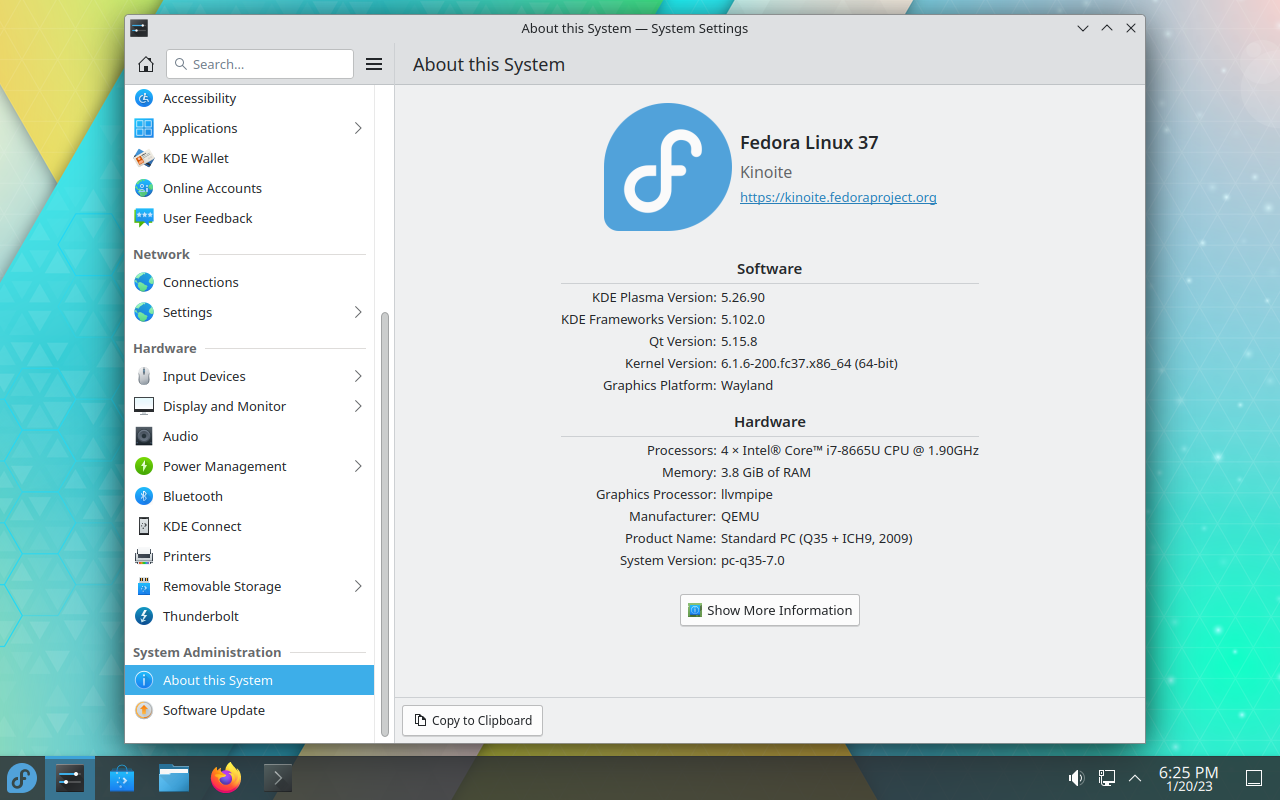Introducing Kinoite Nightly (and Kinoite Beta)
Update (2025-08-08): Kinoite Nightly images are back, using KDE packages built from KDE master branches from solopasha’s COPRs.
$ sudo rpm-ostree rebase --reboot \
ostree-unverified-registry:quay.io/fedora-ostree-desktops/kinoite-nightly:42Update (2023-08-11): Kinoite Nightly & Beta images are temporarily paused while we work on making Kinoite image with Plasma 6 content available.
As announced during the Fedora Kinoite “Hello World!” talk (slides) last year at the Fedora 35 release party, one of the goals for Fedora Kinoite is to make it easier for everyone to try and test the latest KDE Plasma desktop and Apps, without having packaging, compiler or development knowledge.
We are now much closer to that goal with the introduction of Kinoite Nightly, an unofficial variant of Fedora Kinoite based on stable Fedora plus nightly packages for KDE software (Plasma desktop and a base set of apps).
Alonside Kinoite Nightly, we are also introducing Kinoite Beta, which is also an unofficial variant of Fedora Kinoite, also based on stable Fedora but with KDE Plasma Beta packages. This variant is based on fresh release of KDE Plasma 5.27 Beta.
While the Nightly variant will be built daily and will always be available, the Beta variant will only be built and available during KDE Plasma Beta testing phases.
All of this is only made possible by the very good work of the Fedora KDE SIG members that maintain KDE packages for Fedora, including those nightly packages.
Those variants are built daily and published as a container image hosted in repos on Quay.io:
- Kinoite Nightly (kinoite-nightly repository on Quay.io).
- Kinoite Beta (kinoite-nightly repository on Quay.io).
Pre-release software notice
Warning: This should be obvious but in case it needs to be said: This is pre-release software that may include major bugs. Only use this on systems where you are confident you will be able to rollback and have backups of your collection of favorite cat pictures.
Additionaly for Kinoite Nightly: The functionnality, features, bugs might change at any time and there is no guarantee of compatibility or stability.
If you find bugs, you are welcomed to report them to KDE developers on bugs.kde.org or to the project on GitLab.
How do I try it?
We currently do not have installation ISOs or pre-installed images available. To try it, you can follow those steps:
1. Install the latest official Fedora Kinoite release.
2. Update your system to the latest version and reboot:
$ sudo rpm-ostree update --reboot3. Pin your current deployment to make sure that you will be able to rollback if something fails:
$ sudo ostree admin pin 04. Switch to either Kinoite Nightly or Kinoite Beta:
# For Kinoite Nightly
$ sudo rpm-ostree rebase --reboot \
ostree-unverified-registry:quay.io/fedora-ostree-desktops/kinoite-nightly
# For Kinoite Beta
$ sudo rpm-ostree rebase --reboot \
ostree-unverified-registry:quay.io/fedora-ostree-desktops/kinoite-beta5. Test and report bugs!

Connecting the packages with the sources in Kinoite Nightly
Note: This mostly applies to Kinoite Nightly as Kinoite Beta is made from released Beta sources.
You can figure out exactly which commit is included in the image by looking at the Git short hash included at the end of the package versions (right before -1.fc37.x86_64 which is the revision, major release and architecture):
$ rpm -qa | grep kf5
...
kf5-kio-core-5.100.0^20221108.0a9215b-1.fc37.x86_64
...
$ rpm -qa | grep plasma
...
plasma-desktop-5.26.80^20221108.a2a62b5-1.fc37.x86_64
...Testing an image built on a specific date
As the images are rebuilt daily, you can also fetch a version that was built on a specific date. You can see all builds (tags) in the repos on Quay.io:
- Kinoite Nightly (kinoite-nightly repository on Quay.io).
- Kinoite Beta (kinoite-nightly repository on Quay.io).
To do that, you need to specify the tag referencing the container image to fetch with the rebase command:
$ sudo rpm-ostree rebase \
ostree-unverified-registry:quay.io/fedora-ostree-desktops/kinoite-nightly:37.20230109.0.be10bf34This should make it much easier to bissect regressions that impact a lot of components, either in KDE packages themselves or in their dependencies.
You can also diff the list of package between two versions with:
$ rpm-ostree db diff
...Or override a specific package with another version or your own build with custom patches for example:
$ rpm-ostree override replace plasma-workspace-XYZ.rpm
...
$ rebootBut what about all the other apps?
Just like Fedora Kinoite, most applications should run just fine as Flatpaks, and we’re working on making most of them available on Flathub (we’re really close now). To be able to test development versions of those apps, you can try them via the Nightly Flatpak repo hosted by KDE.
This single repo might go away or be reworked once we are able to fully move to GitLab CI based builds for Flatpak apps. You’ll be able to get Nightly Flatpak builds for applications directly from the KDE Invent GitLab instance.
See also my post about the future for Flatpak support and integration in KDE.
Conclusion
Feel free to drop by the Fedora KDE channel or to open an issue if you have feedback, suggestions or questions.

Comments
You can also contact me directly if you have feedback.